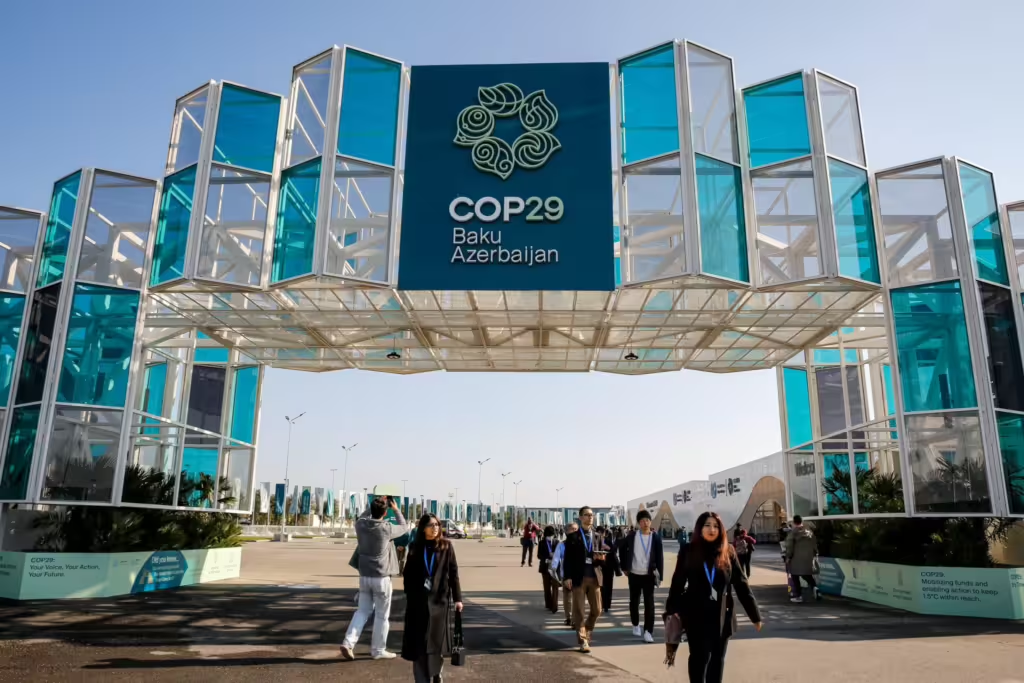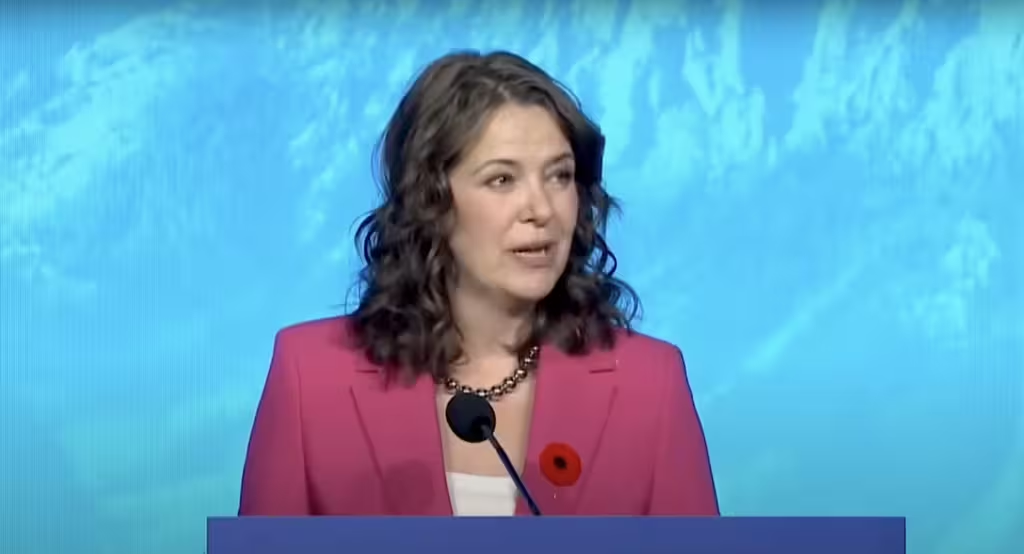It’s no exaggeration to say that the global political terrain fundamentally shifted this year.
Donald Trump is heading to the White House, Keir Starmer helped end 14 years of Conservative rule in the U.K. and Justin Trudeau is ending the year on shaky ground in Canada.
Add to that a growing revival of old-school climate denial, surging oil and gas production, high level calls for PR firms to cut their ties to fossil fuels, emboldened hard-right farming groups, and new anti-greenwashing laws.
It was one of the most volatile and consequential years for climate action we’ve ever tracked at DeSmog. To help you make sense of it, we’ve asked our editors and contributors to weigh in on what they see as the year’s biggest takeaways – and the trends they’re paying attention to heading into 2025.
Subscribe to our newsletter
Stay up to date with DeSmog news and alerts
‘We discovered a lot of new documents’
Brendan DeMelle, executive director: Whenever someone on the DeSmog team finds a new document demonstrating what the fossil fuel industry knew long ago, and we reflect on the fact that humans possessed clear knowledge of climate risks and yet made decisions to deny the science and delay action, it gives us great pause to consider the power of corporate interests over basic self-preservation of our species.
In 2024, we discovered a lot of new documents and evidence demonstrating industry’s early knowledge of climate science dating to the 1950s, and a subsequent pivot to denial and delay strategies that seem unfathomable now. They knew better, they ignored responsible actions for decades, and here we are witnessing the devastating consequences which are in line with Exxon’s own models. People are suffering and dying. And what are the oil majors doing? Doubling down on production.
Publishing this evidence of denial and deception always gives me hope that we can make an impact far greater than our size. Climate justice has the wind in its sails, and every document and data point we can add only quickens the velocity of accountability.
I’m also excited that documents that we found and published years ago continue to have great impact, both in climate liability lawsuits and in civil society. We’re thrilled about the news that Geoff Dembicki’s book ‘The Petroleum Papers’ — which was based on Imperial Oil documents DeSmog found — has been optioned for a TV series.
What I’m paying attention to in 2025: With our recent appointment of Geoff Dembicki as global managing editor, our team will be increasingly connecting the dots between international themes and actors in our global work to expose false solutions and shine light on the reach of climate denial and extreme right-wing attacks on the public interest across the world.
We’ll be tracking the international spread of MAGA and the ongoing work of what we call the architecture of denial — networks like Jordan Peterson’s Alliance for Responsible Citizenship (ARC), Atlas Network, Koch Network, Tim Dunn’s America First Policy Institute (AFPI), Project 2025 and other players. We’ll expose their coordinated efforts to undermine environmental protections and criminalize dissent to crush the public interest. We will not stop fighting for the future. And the way we do that at DeSmog is through hard-hitting investigative journalism that centers accountability for climate delay and denial.
‘A resurgence of old-school climate denial’
Geoff Dembicki, global managing editor: I spent a lot of 2024 reporting on a single person – the Canadian conservative influencer Jordan Peterson, who’s evolved over the past few years into one of the world’s most consequential deniers of the climate crisis. In the spring, I went to sold-out Peterson performances in New York City and Fort Worth, where I learned that he’s using religious appeals to undermine public faith in science. My key takeaway: that anti-climate messages are becoming increasingly central to the worldview of the religious right, complicating political efforts to enlist the public in climate action with appeals to economic self-interest.
What I’m paying attention to in 2025: It’s impossible to ignore the most turbulent political event of 2024 – the reelection of Donald Trump. As we move into 2025, I’ll be paying special attention to the ways that a second Trump administration alters the global landscape of climate disinformation and fossil fuel expansion.
I fear that with Trump’s selection of Chris Wright as Energy Secretary – a fracking executive who’s been eagerly endorsed by the CO2 Coalition and other anti-science organizations – we are set to see an aggressive resurgence of old-school climate denial. And I will be closely looking at the influence Trump’s win has on Canada, where the Conservative Party leader – and fossil fuel populist – Pierre Poilievre is campaigning to unseat Prime Minister Justin Trudeau in a federal election scheduled for 2025.

The COP29 entrance in Baku, Azerbaijan. Credit: Michal Busko / Alamy
Polluting industries’ new front against nature protection
Hazel Healy, UK editor-in-chief: In 2024 I travelled to the UN biodiversity talks in Colombia, with DeSmog reporter Rachel Sherrington. It was DeSmog’s first-ever nature-protection summit, and we’d heard mixed reports about whether there was any business lobbying going on at all. In Cali, along with tropical birds and old-school salsa, we were shocked to find oil and gas majors present, showcasing their biodiversity credentials with no hint of irony, with other usual suspects who used their participation to block regulations, such as the pesticide lobby.
We did what DeSmog did best – mapped, analysed, and counted the delegates, learning that business lobbyists had doubled since the last summit. We applied the same lens, for the third year running to shine a light on ag lobbying at the climate COP less than a month later. My takeaway? That anti-climate agribusiness lobbying is not only here to stay, it’s taking aim at both nature and climate – and both must be tackled together.
What I’m paying attention to in 2025: I will be keeping an eye on how the big ag lobby is organising ahead of the COP30 climate summit in Brazil – seen as a beacon of hope by many in the movement for sustainable food and farming, but subject to powerful meat interests. We will be listening carefully to big ag’s talking points and challenging disinformation when we hear it. It’s also going to be really interesting to see the evolution of fledgling EU laws against greenwashing by corporations, and see whether any more cities follow the lead of Dutch city the Hague in banning fossil fuel ads altogether.
‘Far-right parties gaining a new foothold’
Sam Bright, UK deputy editor: The UK general election dominated my coverage in 2024 – a six-week blitz of stories about the parties and politicians vying for our votes. We followed the money and found that, between the last election and the beginning of the 2024, the ruling Conservative Party had accepted £8.4 million from fossil fuel interests, climate science deniers, and polluting industries. We applied the same methodology to Reform UK, the radical right-wing party led by Trump fanatic Nigel Farage, and found that 92 percent of its funding during the period had come from dirty donors. This was somewhat ironic, given that Farage and his deputy Richard Tice now represent two of the constituencies most exposed to climate change.
What I’m paying attention to in 2025: I will be closely following the tentacles of the Trump administration in 2025 – tracking the ways in which his climate denial agenda is being exported to the UK and Europe. For years, DeSmog has been mapping the connections between dark money libertarian groups on both sides of the Atlantic. With Trump in the White House, Farage climbing in the polls, and far-right parties gaining a new foothold in Europe, these political connections are likely to intensify – posing a major threat to global climate action.
‘Astroturfing and disinformation campaign’
TJ Jordan, investigative reporter (PR/Advertising, False Solutions): I worked for a global PR agency for four years, so I have a headstart in knowing where to look when investigating how these companies quietly protect the fossil fuel industry. In 2024 I analysed agency board directors’ ties to polluting companies; challenged the sustainability award shows rewarding agencies that work for oil producers; and went inside the elite PR firm fostering oil-reliant Azerbaijan’s image as a climate innovator ahead of hosting COP29. But my most challenging (and rewarding) project was a six-month investigation into the dirty tactics of a British-owned PR agency called MetropolitanRepublic.

Protestors from student human rights group Justice Movement Uganda opposing the East Africa Crude Oil Pipeline. Credit: Bruce Nahabwe
The agency “squashed” (their word, not mine) the voices of Ugandan environmental land defenders on behalf of French oil giant TotalEnergies — which is building the world’s longest heated crude oil pipeline across Uganda and Tanzania — with a carefully constructed astroturfing and disinformation campaign called “Action for Sustainability.”
What I’m paying attention to in 2025: U.S.-based ad and PR holding company Omnicom is about to become the biggest provider of marketing, advertising, public relations, and lobbying services to the fossil fuel industry, after it bought fellow industry giant IPG. Outside pressure from the UN and campaign groups like Clean Creatives is increasing on big holding companies to reassess their work protecting the reputations of oil and gas producers. I’ll be keeping a close eye on how the Omnicom-IPG consolidation affects the individual agencies in these holding company networks and their ability to make decisions on who they work for.
‘The fallout of Canada’s new anti-greenwashing law’
Sarah Berman, Canada editor: Our reporters closely followed misleading fossil fuel ads and the fallout of Canada’s new anti-greenwashing law, which targets environmental claims that can’t be backed with evidence. The new legislation pushed the fossil fuel lobbyist group Pathways Alliance to immediately scrub its website of all content. The Canadian Association of Petroleum Producers followed suit, removing a section of its website devoted to carbon capture and storage.
Canada Action, a third-party advertiser that claimed Canadian liquified natural gas (LNG) would help cut global carbon emissions on transit shelter ads, cut references to the environmental benefits of LNG on its website. Canadian oil sands companies even blamed the new law for delayed sustainability reports. Now, major cities like Toronto are looking to ban misleading fossil fuel ads on transit.
What I’m paying attention to in 2025: We’ve seen fewer greenwashing claims on transit in the second half of 2024, but the fight over Canada’s anti-greenwashing legislation is not over and DeSmog will continue to follow the latest developments. Our reporters expect oil sands companies and their allies to fight any effort to hold them accountable for spreading misinformation. Will this new legislation further push emitters to distance themselves from false solutions? Or will a Canadian election bring in a new government that is more favourable to polluters?
‘Agriculture grabbed global headlines’
Phoebe Cooke, UK deputy editor: From the wave of farmers’ protests sweeping Europe to the greenwash of the intensive farming sector – this was a year in which agriculture grabbed global headlines by the scruff of the neck. Ahead of the European elections in June, our team worked with reporters across the EU to track how misinformation was fuelling debates on food and farming.
Our series revealed links between hard-right farming groups and the Viktor Orbán-funded MCC Brussels think tank, dissected the false claims made ahead of the elections as well as the political candidates spreading them, and shone a light on the diverse stances between farming groups on protests. In Ireland, our work mapping the connections of the powerful farming lobby was cited in the parliament (Oireachtas) and became a major talking point ahead of a critical decision by the EU on whether to extend the country’s nitrates derogation.
What I’m paying attention to in 2025: This will be a crucial year for the newly elected European Commission to transform its agriculture and food sectors and to beef up its climate targets. As 720 MEPs get to work, we’ll investigate the populist politicians looking for ways to weaken key legislation, and continue to scrutinise the lobbying tactics of powerful corporations. With elections on the horizon in Germany and Poland, we’ll look to work in partnership with European journalists to enhance our cross-border coverage at this pivotal time.
‘Trump-oriented politics within Canada’
Mitchell Anderson, Canada contributor: I spent much of 2024 focusing on the evolving situation in Alberta, which produces almost 40 percent of Canada’s emissions with only 12 percent of the population. This work included itemizing unfunded environmental liabilities associated with fossil fuel extraction, particularly expanding oil sands operations. Alberta is also pushing the Pathways carbon capture scheme, a twice-rejected coal mine expansion in the foothills of the Rockies, and funded a $7 million “scrap the cap” ad campaign that would likely violate new federal competition regulations if the province was a company.
All of these issues have been fertile ground for Desmog commentary that seeks to highlight cracks and contradictions within populist Alberta politics.

Alberta Premier Danielle Smith speaks at the UCP annual meeting, where delegates voted for an erroneous resolution claiming atmospheric CO2 is at a 1,000-year low. Credit: Danielle Smith / YouTube
What I’m paying attention to in 2025: The second Trump administration promises to upend many norms within society, politics, and the energy sector. DeSmog is well positioned to highlight how this chaotic political period will impact renewable technology, the fossil fuel industry, and our climate future. I will continue to focus on stories about the evolving situation in Alberta, which in many ways has become a cultural beachhead for Trump-oriented politics within Canada.
Neighbouring British Columbia has become a political counterweight by aggressively scaling up renewable energy, creating numerous opportunities for contrasting case studies that highlight these diverging trajectories. A Canadian election in 2025 will add additional interest to a turbulent year as Pierre Poilievre seeks to centre his campaign against carbon pricing – often in the absence of facts.
‘The DeSmog team will be very busy’
Taylor C. Noakes, Canada contributor: My focus areas in 2024 were principally industry and political reactions to new anti-greenwashing legislation; debunking industry-friendly (and often politically expedient) false solutions to the climate crisis (like LNG, hydrogen, and carbon capture); and Canada’s ongoing culture war against renewables, which has resulted in nonsensical political decisions (like instituting a solar and wind power moratorium in Canada’s sunniest and windiest province).
As in years past, I covered a number of major industry conferences in Canada and the United States (including annual carbon capture, hydrogen, LNG, and oil/gas industry conferences, mostly in Alberta). Highlights from these events include a ten minute one-on-one scrum with the Premier of Alberta on the failures of carbon capture, and reporting on Jane Fonda leading an anti-LNG protest (whose turnout was larger than the number of conference attendees).
What I’m paying attention to in 2025: I anticipate the new American president’s energy policies will have profound effects on Canada – whether it’s tariffs that sink what’s left of Canada’s oil and gas sector, American resource nationalism that prioritizes local resource exploitation over Canadian imports (or some combination thereof), or a Canadian reaction to U.S. trade war sabre rattling that emphasizes either an accelerated transition or the subsidized development of new markets for old technology.
Whatever course it takes, I suspect the DeSmog team will be very busy. I’m looking forward to how this shakes out at the series of annual conferences I typically attend. In addition, I plan on keeping a close eye on hydrogen and carbon capture projects, as well as the growing grassroots resistance to fossil fuels, pipelines, and the industry in general. Successful Indigenous resistance to fossil fuel projects offers exciting opportunities for optimistic climate-change related reporting. Similar efforts by cities to ban fossil fuel advertising, and the use of gas for cooking, as well as rural communities banning CO2 pipelines, indicate real momentum and tangible results from the ground up.
The immovable object that is the fossil fuel sector is meeting the unstoppable force that is people’s innate desire to live on a healthy planet. 2025 is going to be a thrilling year for environmental reporting.
‘Focusing on the financial’
Sharon Kelly, U.S. reporter: One of the oldest adages in investigative reporting is to follow the money. In seeking to understand what’s driving fossil fuel companies to double down on greenwashing and environmentally damaging projects, it helps to have a clear picture of what their incentives are and how those incentives are created. My work for DeSmog in 2024 focused on the financial: examining federal subsidies for carbon capture, created in the name of combatting climate change but with the effect of making it worse; reporting on evidence shale drillers attempted price-fixing to inflate oil prices, and on price-gouging by corporations when climate-fueled disasters strike; and seeking to understand oil and gas industry liabilities like abandoned wells – and what happens on the ground when companies fail to pay to clean up.
What I’m paying attention to in 2025: The risks and uncertainties surrounding fossil fuels are, if anything, amplified by the incoming administration. Despite the Trump administration’s ties to the oil and gas industry, Trump’s first term was marked by upheaval and disruptions for fossil fuel companies (and the rest of us). Autocratic impulses are often, at their core, a telling sign of fragility.
Whatever 2025 brings, we intend at DeSmog to keep the heat on the industry by examining the financial side of the climate crisis and the companies that have fueled it – whether that’s investigating the role false solutions play in oil and gas companies’ plans for the future, scrutinizing how over-hyped investments can cause outsized environmental damage while falling short for communities and investors alike, or staying watchful for fossil fuel companies seeking to benefit from the political power of the far-right (and vice versa).
‘Mapping the big money and political connections’
Adam Barnett, UK reporter
2024 was a target rich environment for anyone looking to cover climate denial, with a mountain of smog descending on the UK. So much, in fact, that I had to compile a map of the donors, media, think tanks, and fossil fuel companies pushing the Conservative government to turn against net zero. I also debunked the big climate myths peddled during the UK general election campaign, since the British media wasn’t going to.
I gave the post-election Tory leadership contest the same treatment, exposing the climate record of the candidates and the dirty money pumped into the campaign – along with the Tories’ growing ties to Donald Trump’s Project 2025.
I covered the rise of Nigel Farage’s right-wing Reform UK, recording its climate denial views and polices, and mapping the big money and political connections of this supposedly anti-establishment party – including one donor accused of sexual harassment and another with money in Russia. When millionaire GB News owner Paul Marshall bought the influential Spectator magazine, I revealed his hedge fund’s ties to a major oil and gas investor, (that’s on top of its own fossil fuel investments).
What I’m paying attention to in 2025: With Conservative Party leader Kemi Badenoch flying to Washington to build ties with the incoming Trump team, a U.S. ambassador to the UK with oil and gas interests (both also covered in 2024), and Reform’s Nigel Farage curling up at the feet of Elon Musk, I expect to be covering the growing influence of Trumpian climate denial on the UK — along with transatlantic groups like Jordan Peterson’s Alliance for Responsible Citizenship (ARC), which is headed by a Tory peer.
I’ll also continue to expose the climate deniers hijacking protests around farming and anti-pollution schemes, and hold the Labour government to account on its climate targets.
Subscribe to our newsletter
Stay up to date with DeSmog news and alerts







